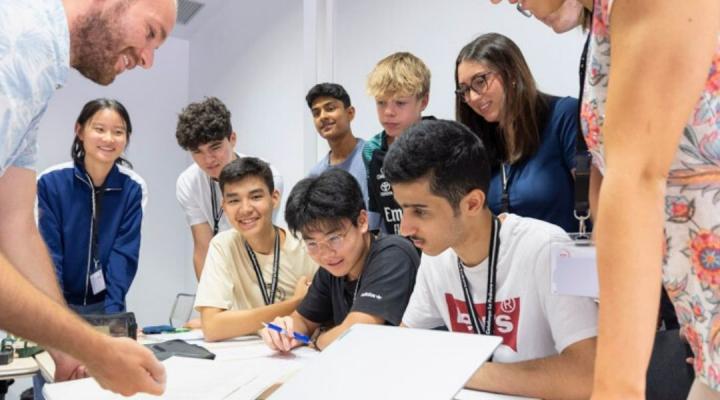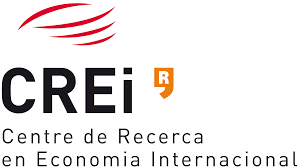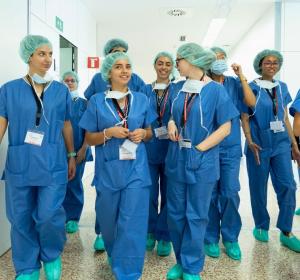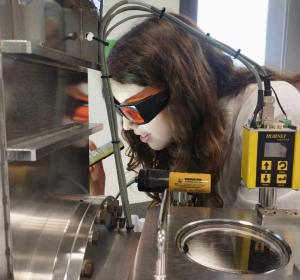
Economia
El curs
És fàcil adonar-se de la importància de l'economia a la nostra societat. Sovint les nostres vides es veuen afectades per algun esdeveniment econòmic, ja sigui a nivell general o individual.
La discussió sobre temes econòmics en mitjans de comunicació o en entorns polítics és habitualment força esbojarrada... Ja no diguem a internet! En canvi, la recerca en economia es basa en arguments lògics i l'evidència empírica, com qualsevol altra ciència.
Si t'agrada la ciència i voldries fer-la servir per analitzar problemes socials, t’agradarà Bojos per la Ciència. Economia. Investigadors i professorat vinculats al CREI i al Departament d'Economia i Empresa de la UPF t’explicaran els seus estudis sobre diferents temes econòmics i socials.
Les sessions descriuran un tema d'interès, la seva importància, els mètodes matemàtics i estadístics que utilitzem per estudiar-lo i els resultats obtinguts. Parlarem de mercats financers, política monetària i escalfament global, entre molts altres temes, per donar a conèixer l’entorn multidisciplinari que ofereix l’economia, on conflueixen disciplines diferents com les matemàtiques i l'estadística, per resoldre reptes relacionats amb alguns dels fenòmens econòmics i socials més rellevants de la nostra societat.
Aquesta recerca sovint acaba tenint impacte en les polítiques que se segueixen i les decisions de les empreses.
Tractarem els següents àmbits:
- Mercats financers, expectatives i informació.
- Economic conductual.
- Mercat de treball i fluctuacions econòmiques.
- Política fiscal i monetària.
- El canvi climàtic i l'economia.
- Desigualtats de gènere.
- Intercanvi sense diners.
- Economia de ciutats.
- Les organitzacions econòmiques internacionals.
El curs s'adreça a estudiants de 1r i 2n de batxillerat amb un excel·lent nivell de matemàtiques i gran interès per veure com la recerca en economia pot ajudar a donar resposta a les principals inquietuds que té la societat.
Les sessions seran indistíntament en català, castellà i anglès. Per a un adequat seguiment de les sessions, és necessari un nivell excel·lent d'anglès i matemàtiques.
Sessions 2026
Dia: dissabte 17 de gener, 2026.
Horari: 10.30h a 13.30h.
Lloc: Centre de Recerca en Economia Internacional - Carrer de Ramon Trias Fargas, 25-27.
Coordinació de la sessió: Anna Bahí.
Sessió a càrrec de: Isaac Baley.
Idioma: anglès.
In today’s world, the most valuable companies aren’t those that own the most land, factories, or machines — they’re the ones that own and use data. The clicks you make, the routes your phone suggests, and the songs you stream all generate data that shapes how companies compete, set prices, and design new products. We will explore how data helps predict the future, reduce risk, drive innovation, and reshape the economy we live in.
Dia: dissabte 24 de gener, 2026.
Horari: 11.00h a 13.30h.
Lloc: Centre de Recerca en Economia Internacional - Carrer de Ramon Trias Fargas, 25-27.
Coordinació de la sessió: Anna Bahí.
Sessió a càrrec de: Jan Eeckhout.
Idioma: anglès.
Since 1980, the world economy has been undergoing a fundamental transformation. Profits and stock valuations of dominant firms are growing faster than ever, seemingly a sign of economic growth and progress. At the same time, we see that wages for production and service workers are stagnating, that labor dynamism and labor participation are falling, and that the number of startup companies is decreasing. This lecture asks what is going on in the global economy, and discusses policy solutions.
Dia: dissabte 31 de gener, 2026.
Horari: 10.30h a 13.30h.
Lloc: Centre de Recerca en Economia Internacional - Carrer de Ramon Trias Fargas, 25-27.
Coordinació de la sessió: Anna Bahí.
Sessió a càrrec de: Victoria Vanasco.
Idioma: castellà.
The class introduces students to information frictions in economics, with an application to financial markets. The concepts of adverse selection and moral hazard are presented, followed by a discussion on how such frictions may affect the well functioning of financial markets and the real economy, and on which mechanism can ameliorate these frictions.
Dia: dissabte 7 de febrer, 2026.
Horari: 11.00h a 13.30h.
Lloc: Centre de Recerca en Economia Internacional - Carrer de Ramon Trias Fargas, 25-27.
Coordinació de la sessió: Anna Bahí.
Sessió a càrrec de: Giacomo Ponzetto.
Idioma: anglès.
More than half of the world's population now lives in cities. Why do so many people live in so few places? This lecture will provide an overview of the economic study of the causes and consequences of urban agglomeration. We will introduce the seminal concept of spatial equilibrium: people choose to live where they are more productive, where they face a lower cost of living, and where they enjoy a higher quality of life. We will discuss housing markets as the crucial determinant of the urban cost of living. We will investigate why cities make us more productive, introducing the concept of agglomeration economies and focusing on the importance of the flow of ideas in a dense urban environment.
Dia: dissabte 14 de febrer, 2026.
Horari: 11.00h a 13.30h.
Lloc: Centre de Recerca en Economia Internacional - Carrer de Ramon Trias Fargas, 25-27.
Coordinació de la sessió: Anna Bahí.
Sessió a càrrec de: Humberto Llavador.
Idioma: anglès i castellà.
Mitigating the impact of climate change requires a drastic reduction in emissions and significant investments in adaptation. Who has to reduce emissions and how much? Who finances adaptation? Or what mechanisms induce countries to reach agreements and comply with them? These are difficult questions to answer but for which the instruments of economic analysis can help. In this session we will introduce the economics of climate change and use experiments to discuss some of its economic dilemmas. We will focus on climate change as a global and intertemporal public good that requires cooperation and suffers from great uncertainties, negative externalities, and the tragedy of the commons.
To participate in the experiments you will need a smartphone or a tablet with an internet connection and enough battery.
Dia: dissabte 21 de febrer, 2026.
Horari: 11.00h a 13.30h.
Lloc: Centre de Recerca en Economia Internacional - Carrer de Ramon Trias Fargas, 25-27.
Coordinació de la sessió: Anna Bahí.
Sessió a càrrec de: Rose Marie Nagel.
Idioma: anglès.
You have signed up for a class on experimental economics. We will discuss several economic experiments in which you first participate and then we analyze your behavior. Further, we compare your behavior with the mathematical predictions based on so-called rational behavior. Finally, we study whether such abstract situations are useful for the real world.
Dia: dissabte 28 de febrer, 2026.
Horari: 11.00h a 13.30h.
Lloc: Centre de Recerca en Economia Internacional - Carrer de Ramon Trias Fargas, 25-27.
Coordinació de la sessió: Anna Bahí.
Sessió a càrrec de: Caterina Calsamiglia.
Idioma: català i anglès.
En molts contextos de l’economia trobem que l’assignació de recursos no ve governada per un sistema de preus. Per exemple, no existeix un mercat amb preus per als ronyons, ni l’assignació de nens a escoles o universitats, ni de residents a hospitals o de nens a famílies adoptives. Les normes que defineixen aquest tipus d’assignacions tenen un impacte en la igualtat d’oportunitats de la nostra societat. Analitzarem el cas concret dels mecanismes d’assignació de nens a escoles públiques de Catalunya i arreu del món.
Dia: dissabte 7 de març, 2026.
Horari: 11.00h a 13.30h.
Lloc: Centre de Recerca en Economia Internacional - Carrer de Ramon Trias Fargas, 25-27.
Coordinació de la sessió: Anna Bahí.
Sessió a càrrec de: Mar Reguant.
Idioma: català.
En aquesta sessió parlem de com l'economia ens ajuda a entendre com funcionen els mercats elèctrica i a entrendre tots els canvis que hi han hagut en aquest sector. També parlarem dels reptes del canvi climàtic i la transició energètica, i els impactes econòmics i socials que aquests tenen.
Dia: dissabte 14 de març, 2026.
Horari: 11.00h a 13.30h.
Lloc: Centre de Recerca en Economia Internacional - Carrer de Ramon Trias Fargas, 25-27.
Coordinació de la sessió: Anna Bahí.
Sessió a càrrec de: Rosa Ferrer.
Idioma: castellà.
During this session we will study the possible determinants of gender gaps in the labor markets among individuals with high-education level. We will study traditional explanations for gender gaps in earnings such as discrimination and child rearing, as well as more recently studied alternative hypotheses such as performance pay and the potential effects of gender roles in career aspirations.
Dia: dissabte 21 de març, 2026.
Horari: 11.00h a 13.30h.
Lloc: Centre de Recerca en Economia Internacional - Carrer de Ramon Trias Fargas, 25-27.
Coordinació de la sessió: Anna Bahí.
Sessió a càrrec de: José Apesteguía.
Idioma: castellà i anglès.
Economics is built on the basis of a model of individual behavior. In the first part we will outline the basics of the standard rational model of economic decision-making. We will emphasize it's instrumental value for the understanding of a large diversity of economic issues. In the second part we will cover recent attempts in the behavioral economics literature that have the aim of enriching the psychological foundations of economic models of decision-making in order to improve it's predictive power.
Dia: dissabte 11 d'abril, 2026.
Horari: 11.00h a 13.30h.
Lloc: Centre de Recerca en Economia Internacional - Carrer de Ramon Trias Fargas, 25-27.
Coordinació de la sessió: Anna Bahí.
Sessió a càrrec de: Elisa Giannone.
Idioma: anglès.
Every year, millions of people move within and across countries, some looking for jobs, others escaping from wars or for better opportunities for their families. When people move, there are consequences both for the country of origin and for the country of destination. We will focus on understanding the causes and the consequences for people moving in developing countries. Why do people move? Why do people move less than what would be predicted?
What are the existing theories of migration? Migration might have many consequences on the political, social and economic sides. In this session, we'll be looking to answer each of the questions above, among others.
Dia: dissabte 18 d'abril, 2026.
Horari: 11.00h a 13.30h.
Lloc: Centre de Recerca en Economia Internacional - Carrer de Ramon Trias Fargas, 25-27.
Coordinació de la sessió: Anna Bahí.
Sessió a càrrec de: Davide Debortoli.
Idioma: anglès.
Government policies, such as government spending, taxation and interest rates, can have an enormous impact on the prosperity of our economies and social welfare. This session provides an overview of the empirical evidence on the effects of such policies, and of the economic models used to guide policymakers’ choices.
Dia: dissabte 25 d'abril, 2026.
Horari: 10.30h a 13.30h.
Lloc: Centre de Recerca en Economia Internacional - Carrer de Ramon Trias Fargas, 25-27.
Coordinació de la sessió: Anna Bahí.
Sessió a càrrec de: Jaume Ventura.
Idioma: català.
Aquesta sessió analitzarà el comerç regional a Europa. La primera part es centra en la evidència empírica. La segona part planteja un model teòric per analitzar l'impacte econòmic i social d'aprofundir en el projecte d'integració comercial a Europa.





